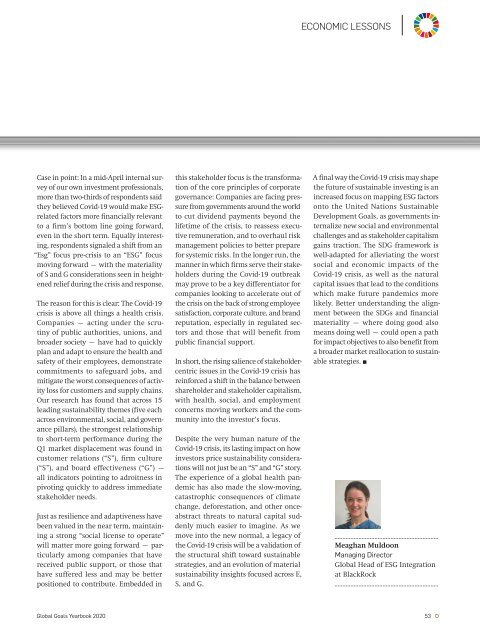Planet under Pressure
The 2020s are the make-or-break decade for Sustainability. But Covid-19 questions almost everything. How can we handle increasingly frequent shocks? What can a resilient society and economy that is in line with planetary boundaries look like? These and many other questions are discussed in the new 2020 edition of the Global Goals Yearbook titled “Planet under Pressure”. The Yearbook supports the UN Sustainable Development Goals and is one of the publications in strong international demand.
The 2020s are the make-or-break decade for Sustainability. But Covid-19 questions almost everything. How can we handle increasingly frequent shocks? What can a resilient society and economy that is in line with planetary boundaries look like? These and many other questions are discussed in the new 2020 edition of the Global Goals Yearbook titled “Planet under Pressure”. The Yearbook supports the UN Sustainable Development Goals and is one of the publications in strong international demand.
You also want an ePaper? Increase the reach of your titles
YUMPU automatically turns print PDFs into web optimized ePapers that Google loves.
ECONOMIC LESSONS<br />
Case in point: In a mid-April internal survey<br />
of our own investment professionals,<br />
more than two-thirds of respondents said<br />
they believed Covid-19 would make ESGrelated<br />
factors more financially relevant<br />
to a firm’s bottom line going forward,<br />
even in the short term. Equally interesting,<br />
respondents signaled a shift from an<br />
“Esg” focus pre-crisis to an “ESG” focus<br />
moving forward – with the materiality<br />
of S and G considerations seen in heightened<br />
relief during the crisis and response.<br />
The reason for this is clear: The Covid-19<br />
crisis is above all things a health crisis.<br />
Companies – acting <strong>under</strong> the scrutiny<br />
of public authorities, unions, and<br />
broader society – have had to quickly<br />
plan and adapt to ensure the health and<br />
safety of their employees, demonstrate<br />
commitments to safeguard jobs, and<br />
mitigate the worst consequences of activity<br />
loss for customers and supply chains.<br />
Our research has found that across 15<br />
leading sustainability themes (five each<br />
across environmental, social, and governance<br />
pillars), the strongest relationship<br />
to short-term performance during the<br />
Q1 market displacement was found in<br />
customer relations (“S”), firm culture<br />
(“S”), and board effectiveness (“G”) –<br />
all indicators pointing to adroitness in<br />
pivoting quickly to address immediate<br />
stakeholder needs.<br />
Just as resilience and adaptiveness have<br />
been valued in the near term, maintaining<br />
a strong “social license to operate”<br />
will matter more going forward – particularly<br />
among companies that have<br />
received public support, or those that<br />
have suffered less and may be better<br />
positioned to contribute. Embedded in<br />
this stakeholder focus is the transformation<br />
of the core principles of corporate<br />
governance: Companies are facing pressure<br />
from governments around the world<br />
to cut dividend payments beyond the<br />
lifetime of the crisis, to reassess executive<br />
remuneration, and to overhaul risk<br />
management policies to better prepare<br />
for systemic risks. In the longer run, the<br />
manner in which firms serve their stakeholders<br />
during the Covid-19 outbreak<br />
may prove to be a key differentiator for<br />
companies looking to accelerate out of<br />
the crisis on the back of strong employee<br />
satisfaction, corporate culture, and brand<br />
reputation, especially in regulated sectors<br />
and those that will benefit from<br />
public financial support.<br />
In short, the rising salience of stakeholdercentric<br />
issues in the Covid-19 crisis has<br />
reinforced a shift in the balance between<br />
shareholder and stakeholder capitalism,<br />
with health, social, and employment<br />
concerns moving workers and the community<br />
into the investor’s focus.<br />
Despite the very human nature of the<br />
Covid-19 crisis, its lasting impact on how<br />
investors price sustainability considerations<br />
will not just be an “S” and “G” story.<br />
The experience of a global health pandemic<br />
has also made the slow-moving,<br />
catastrophic consequences of climate<br />
change, deforestation, and other onceabstract<br />
threats to natural capital suddenly<br />
much easier to imagine. As we<br />
move into the new normal, a legacy of<br />
the Covid-19 crisis will be a validation of<br />
the structural shift toward sustainable<br />
strategies, and an evolution of material<br />
sustainability insights focused across E,<br />
S, and G.<br />
A final way the Covid-19 crisis may shape<br />
the future of sustainable investing is an<br />
increased focus on mapping ESG factors<br />
onto the United Nations Sustainable<br />
Development Goals, as governments internalize<br />
new social and environmental<br />
challenges and as stakeholder capitalism<br />
gains traction. The SDG framework is<br />
well-adapted for alleviating the worst<br />
social and economic impacts of the<br />
Covid-19 crisis, as well as the natural<br />
capital issues that lead to the conditions<br />
which make future pandemics more<br />
likely. Better <strong>under</strong>standing the alignment<br />
between the SDGs and financial<br />
materiality – where doing good also<br />
means doing well – could open a path<br />
for impact objectives to also benefit from<br />
a broader market reallocation to sustainable<br />
strategies.<br />
Meaghan Muldoon<br />
Managing Director<br />
Global Head of ESG Integration<br />
at BlackRock<br />
Global Goals Yearbook 2020<br />
53
















